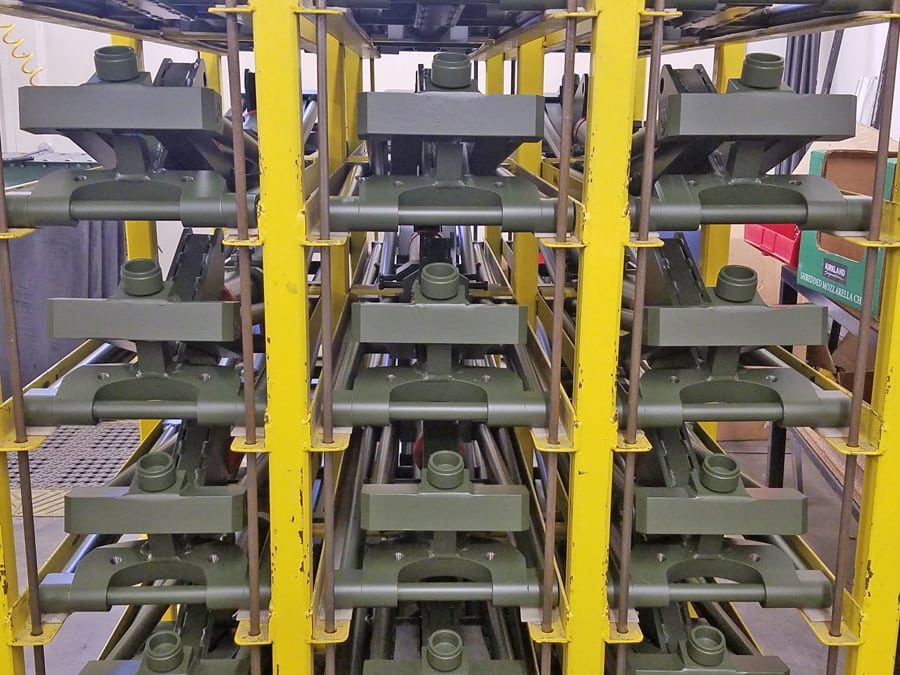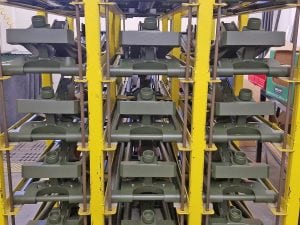
Home » Tri-City businesses succeeding at Making It In Washington program
Tri-City businesses succeeding at Making It In Washington program

June 15, 2017
By Michelle Dupler
When your job is to make the best hydraulic jack you can, also understanding how to reach customers on Facebook might be outside your toolbox.
But for manufacturing businesses in Washington state, help is available through a program that aims to help small and medium-sized manufacturers to change, grow and prosper with the times — whether that’s help with the latest in marketing strategies or getting employees certified in supply chain management.
Make It In Washington is one of 10 programs created under the former Obama administration’s Make It In America grants and provides rural manufacturers with a range of consulting services and educational subsidies to train employees in key functions that can make their businesses operate more efficiently.
The stated goal is to “increase manufacturing capacity, strengthen supply chains, attract investment, and create new opportunities for businesses and individuals,” according to program materials.
Services include strategic consulting that may include helping companies to develop a business or marketing plan, finding funding or capital, learning how to understand and overcome supply chain challenges, as well as providing tuition-free online education through one of three participating Washington colleges and universities.
The program is a partnership between Innovate Washington, which offers consulting services to small and mid-sized businesses; Impact Washington, which works with larger employers; the Washington State Workforce Training and Education Coordinating Board, which helps with worker training; and Washington State University, Shoreline Community College and Highline College, which provide classes relevant to manufacturing operations.
Tri-City businesses that have participated, such as The Bogert Group, Isoray Medical Inc. and SIGN Fracture Care International, each have said they saw positive benefits from their involvement.
“Make It In Washington has impacted our business in many ways that I can’t imagine would have happened without them,” said Richard Bogert, owner of The Bogert Group in Pasco, a company with four separate manufacturing arms. “Who we are today and what we are doing today wouldn’t have happened if not for those organizations coming in and helping our company.”
Why manufacturing?
During the recession, some rural communities in Washington were plagued with high unemployment figures, especially as industries like logging no longer provided the economic boon they once did, or manufacturing plants that had provided good, steady jobs shut down, like the ConAgra potato processing plant in Prosser that closed in 2010, laying off most of its 250 workers in a town of fewer than 6,000 people.
“There were a lot of industries that just disappeared as a result of the recession,” said Mike Brennan, economic development specialist for the Workforce board.
While agriculture and food processing remain bedrock industries in Washington and in the Tri-Cities, there also has been a shift in emphasis in the manufacturing sector in Eastern Washington toward technology-based businesses as offshoots from Hanford and Pacific Northwest National Laboratory.
“Around Hanford there was tremendous change as federal contracts went away,” Brennan said. “What was left were highly educated folks who didn’t want to move. They created their own businesses — technology-oriented businesses in the Tri-Cities area. Those are the kinds of things we’ve run into.”
Additionally, Brennan said he’s seeing business owners with young families moving from larger urban areas to smaller communities and rural areas, like the Tri-Cities and surrounding region, and bringing their tech-based businesses with them.
“They like having small communities with good schools and the lifestyle,” he said.
Make It In Washington can provide both start-ups and established businesses with the tools they need to succeed and grow — and build a strong, innovative manufacturing base in the state that provides steady jobs, Brennan said. “Studies show (manufacturing) is a great employment opportunity for folks,” he said.
He noted that manufacturing jobs are important because they often don’t require a college degree, making them accessible to people who have a high school diploma and perhaps some technical training. They also tend to pay better wages than retail or tourism jobs, so they provide a more stable living for families.
Manufacturing businesses also contribute to the tax base in communities where they’re located, he added. “They are a key sector in these communities,” Brennan said.
Practical results
Bogert said his company used both the business consulting and online education portions of the program. He said the program provided him with a personal representative who answered questions, helped evaluate ideas and assisted in keeping him apprised of opportunities. His employees also received training on product development and lean manufacturing.

“The marketing side was where we needed the most help,” he said. “We needed help with using social media effectively, so that’s part of it.”
The consultant also helped the company with messaging, pricing and distribution channels. By getting feedback and mentoring on a range of marketing topics, the company has seen significant growth.
“As a result, Bogert Aviation was up 20 percent this past year and Safe Jack was up 40 percent,” Bogert said. “We’re looking at the same this year.”
His company operates under a unique model in that each of its four manufacturing arms — Bogert Aviation Inc., Safe Jack, Uncle Norm’s Marine Products, and Bogert International Inc. — produce different products, but use the same base of employees. So an employee might work at Bogert Aviation one day and Uncle Norm’s Marine Products the next. They need to be versatile and able to move from one manufacturing operation to another fluidly.
The education component of the program allowed Bogert Group employees to complete online courses that allowed them to learn while continuing to work — and bring real-time knowledge to the job.
The benefit of real-time learning was also noted by employees at Isoray Medical Inc. and SIGN Fracture Care International.
Krista Cline, director of Operations for Isoray, said the Richland-based manufacturer had an employee pursue a supply chain certificate through WSU’s online classes and saw immediate results.
“I think we started seeing results right away when he started classes,” she said. “Based on what he was learning, he asked questions about processes and would take the opportunity to change them for the better.”
And that knowledge then flows to other employees, she added.
Paul DeVasConCellos, a mechanical engineer at SIGN, completed a Six Sigma Quality Management “black belt” certificate through Washington State University that allows him to look at manufacturing processes at the company and find ways to streamline, reduce waste and innovate. As a nonprofit that produces nails used to treat serious fractures in developing countries, any increase in efficiency means more people who can be helped.
“About every $100 is a patient who can walk again,” DeVasConCellos said. “We see a direct impact for reducing costs.”
Kim Zentz, director of the Engineering and Technology Management Program in the Voiland College of Engineering and Architecture at WSU, where the online classes are housed, said tuition is subsidized by a federal grant so the businesses and employees only have to pay the university application fee and cost of books, which the students are able to keep.
The classes are regular university classes and employees must apply to the university, either as undergraduate or graduate students, just like any other prospective student, she said.
The WSU program offers graduate-level certificate programs in project management, Six Sigma Quality Management, manufacturing leadership, constraints management, and logistics and supply chain management. Undergraduate-level classes are available in project management, Six Sigma Quality Management, and manufacturing leadership.
How to participate
The grants that fund the program will sunset at the end of 2017, but Brennan said there’s still time for manufacturing businesses to participate. For information, contact Brennan at mike.brennan@wtb.wa.gov.
The deadline to apply for fall 2017 classes at WSU is July 24. Information about the Engineering and Technology Management program is available online at https://etm.wsu.edu.
Local News Manufacturing
KEYWORDS june 2017





